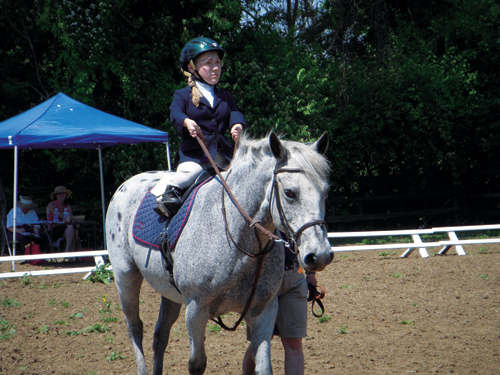
Sarah Baugher riding Just as Good as They Come. Sarah rides with both the 4-H TRP and with The Retreat during the summer.
Written By Anne Blue
About 30 years ago, Karen Scott sat on the hill overlooking the Westminster High School stadium, taking photos of the Special Olympics events held there that day. She heard a voice over the loudspeaker announcing a demonstration of the new Therapeutic Riding program.
Scott watched the horses and their special riders come on to the field and knew she had found one of her life’s passions.
“I remember jumping up and running down to meet the man behind the voice – Bob Shirley – who is considered the voice of the Maryland 4H horse program,” said Scott. “I had to meet him. I knew I wanted to be a part of this program because it married my two interests: special education and horseback riding.”
Launched by Shirley at his Carroll County farm in 1978, the 4-H Therapeutic Riding Program of Carroll County now operates in its own indoor arena at the Carroll County Agriculture Center in Westminster.
Fueled by the talents and time of more than 50 volunteers who give 1,300 hours of service each session, the riding program continues its original mission of providing the benefits of horse riding to children and adults with disabilities.
“Riding is physically good for our students,” said Scott. “It facilitates their own walking motion and opens up pathways in their brains as well as increasing their core strength. It also gives our riders a chance to be in charge.”
Riders, ranging in age from 3 to 73, have included people with a variety of physical and cognitive disabilities such as Down’s syndrome, spina bifida, and congenital amputations.
“Our students range from those who ride only at a walking pace with volunteer assistants on each side of the horse,” said Scott, “to those who have progressed over the years to riding independently at walk, trot, canter, and even jumping.”
“We have lots of riders who have been with us for years, and we have watched them grow up,” said Scott. “It can be like old home week at the barn.”
Scott, who lives with her family in Westminster and works in Special Education Assistive Technology for Carroll County Public Schools, has donated her time to the therapeutic riding program since her first meeting with Shirley.
She also volunteers as the president of the Board of Directors of the 4-H Therapeutic Riding Program of Carroll County, and as one of four certified therapeutic riding instructors.
Scott can quickly name many of the riders and their families who have enjoyed the Therapeutic Riding program. She also recounts the names and qualities of the horses who have carefully carried their special riders.
“There was General, a beautiful horse; Tippy, a saint who lifted his head to re-seat a rider who had lost her balance and fallen forward; Hot Shot, an amazing athlete, who was named Therapy Horse of the Year at the Devon Horse Show and called a model horse; and Liberty, an icon of the program, a Shetland pony who carried riders for 20 years, was crowned National Therapy Horse of the Year in 1998.”
The program utilizes seven horses during each session; some belong to the program and some are on loan. When the program is not in session, therapy horses return to their own farms or go to people willing to donate care for them in their off season.
Program costs are currently about $6,000 a month for each two-month session, which includes feed, care, and vetting for the horses, but does not allow for emergencies. The 501(c)(3) program receives its funding from grants, donations and in-kind donations.
On the national level, most therapeutic riding programs have a paid staff and charge high fees for participants. Carroll County program participants pay a nominal registration fee of $15 per lesson.
“We are professionals who choose to volunteer our time and expertise,” said Scott. “This allows us to keep our fees at a minimum for our students and their families, who typically have so many other expenses associated with these disabilities.”
Westminster resident Megan Roland, now 34, started therapeutic riding 28 years ago as a 6-year-old. Her mother, Peggie Roland, is the volunteer registrar for the program, and while Megan continues as a rider, she also volunteers for the program.
“Over the years, therapeutic riding has offered us a lot of fun as a family and a way to make friends,” said Peggie. “For Megan, it gives her self-confidence, the ability to participate in a sport, physical fitness, and really great friends.”
The biggest challenge facing the program is finding another generation of people willing to take over from those volunteers who have run therapeutic riding for decades.
“It is increasingly difficult to find young people with the level of commitment and passion needed to take over the program,” said Scott.
But Scott remains hopeful, and her personal rewards continue to be great.
“Our barn is a rejuvenating and positive place to be,” she said. “You see gains in the riders while the moms and families are watching, but also socializing with each other and comparing notes on their children. When it gets right down to it, it is just good therapy!”

